16.04.2025.Todays.UT News of India.by Team S
Dalit History Month: India Gets Her Second Dalit CJI in B.R. Gavai
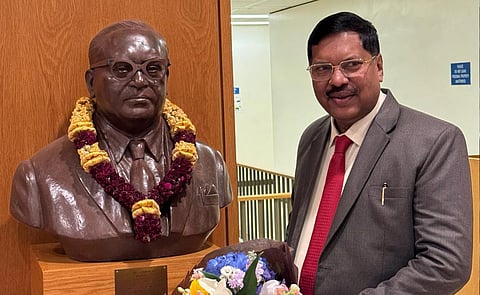
New Delhi- Justice Bhushan Ramkrishna Gavai has been named the 52nd Chief Justice of India, set to take office on May 14, 2025, succeeding Justice Sanjiv Khanna, who retires the previous day. Justice Gavai will make history as the second Dalit to hold the position, following Justice K.G. Balakrishnan (2007–2010), marking a significant milestone for inclusivity in India’s judiciary.
Born on November 24, 1960, in Amravati, Maharashtra, Justice Gavai is the son of R.S. Gavai, a prominent social activist, former MP, and ex-Governor of Bihar and Kerala. Enrolling as an advocate in 1985, he practiced Constitutional and Administrative Law at the Bombay High Court, representing bodies like the Municipal Corporations of Nagpur and Amravati, and Amravati University. From 1992, he served as Assistant Government Pleader and Additional Public Prosecutor at the Nagpur Bench, rising to Government Pleader and Public Prosecutor by 2000.
Justice Gavai’s judicial career began as an Additional Judge of the Bombay High Court in 2003, becoming permanent in 2005. He presided over cases in Mumbai, Nagpur, Aurangabad, and Panaji before his elevation to the Supreme Court on May 24, 2019. The Collegium cited his seniority, integrity, and the need for Scheduled Caste representation in recommending his appointment.
In the Supreme Court, Justice Gavai contributed to pivotal rulings, including the 2023 validation of the 2016 demonetization policy, the abrogation of Article 370, and the declaration of the electoral bonds scheme as unconstitutional. He also participated in the contempt case against advocate Prashant Bhushan. As Executive Chairman of the National Legal Services Authority and Chancellor of Maharashtra National Law University, Nagpur, he has championed legal access and education. In March 2025, speaking at Kenya’s Supreme Court, he highlighted technology’s role in justice delivery while cautioning against misinformation from livestreamed court proceedings.
Justice Gavai will assume the CJI role with an oath administered by President Droupadi Murmu, serving until his retirement on November 23, 2025. His appointment reinforces the judiciary’s commitment to diversity and constitutional principles.
Police Protection for Bindoli in Rajasthan's Chittorgarh Village—Why Does Fear Loom Over Dalit Weddings in India?
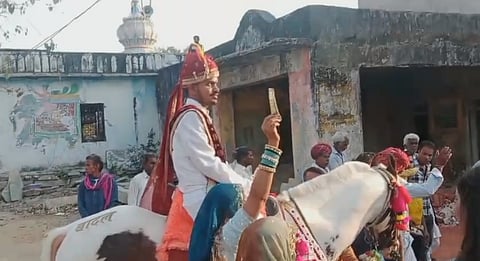
Chittorgarh- On April 15, a Dalit wedding procession, known as a bindoli, was conducted under tight police protection in Naugaun village, located in the Mangalwad police station area of Dungla sub-division, Chittorgarh district, Rajasthan.
The procession, part of Rahul Meghwal’s wedding celebrations, proceeded peacefully with the presence of senior police officials, including the Deputy Superintendent of Police (DYSP) from Badi Sadri, and officers from Mangalwad, Nikumbh, and Dungla police stations.
Social activists, including Shankar Lal Meghwal, Prahlad Jatiya of Bhim Army, and others, joined the event, ensuring community support. This incident, while peaceful, underscores a troubling reality: Dalit wedding processions in Rajasthan and other north Indian states often require heavy security due to fears of caste-based opposition, reflecting deep-rooted social tensions.
Shankar Bildi, a community member told The Mooknayak, the bindoli for a child’s mundan ceremony on May 22, 2024, had previously faced resistance from influential members of the so-called general castes in Naugaun. The procession was only possible with police intervention, highlighting a recurring pattern of apprehension among Dalit families.
Fearing similar disruptions for Rahul Meghwal’s wedding, the family preemptively informed the Mangalwad police, prompting the administration to deploy a robust security arrangement. The peaceful execution of the bindoli was a testament to proactive measures but also a stark reminder of the persistent fear that overshadows Dalit celebrations in rural Rajasthan.
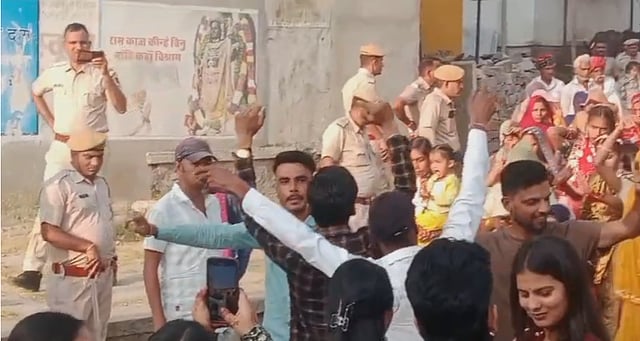
The fear surrounding Dalit weddings stems from entrenched caste hierarchies and resistance from dominant caste groups, such as Rajputs, Jats, and Gurjars, to Dalit assertions of dignity. The tradition of a groom riding a horse or conducting a grand procession is often seen as a challenge to upper-caste dominance, leading to violent backlash.
A 2014 report by The Hindu noted that while the SC/ST (Prevention of Atrocities) Act, 1989, aims to protect Dalit dignity, convictions remain rare, emboldening perpetrators.
Data from the National Crime Records Bureau (NCRB) for 2020 shows Rajasthan reporting 8,028 cases of crimes against Scheduled Castes, the highest in India, out of 47,064 nationwide. This statistic underscores the systemic nature of caste-based discrimination in the state. Social activists assert that even basic rights, like conducting a wedding procession, are contested in Rajasthan.
The issue is not unique to Chittorgarh but reflects a statewide challenge. In January 2025, A Dalit groom, Vijay Regar, rode a mare during his bindoli in Lavera village in Ajmer under the protection of 200 police personnel, as reported by NDTV. The bride’s family had sought administrative support, anticipating opposition from upper-caste locals. The Gurjar community’s cooperation marked a positive step, but the heavy police presence underscored ongoing tensions.
News18 reported that in November 2024, Ashish, a Dalit groom from Alwar, rode a mare for the first time in his village’s history , protected by police who outnumbered the wedding guests. The family’s request for security was driven by past disruptions, including an incident years earlier when Ashish’s sister’s wedding faced threats.
In February 2022, Dalit IPS officer Sunil Kumar Dhanwanta’s bindoli procession in Jaisinghpura village in Jaipur, required police protection due to fears of upper-caste opposition. The officer’s family cited a 2001 attack on his aunt’s groom as a precedent, illustrating the persistence of caste-based hostility.
Recent Incidents of Opposition to Dalit Weddings in Madhya Pradesh and Uttar Pradesh
In a village near Mhow in Indore district, Madhya Pradesh, a Dalit groom performed worship at a Lord Ram temple under police protection on Monday.
According to eyewitnesses and a video that went viral on social media, the groom, accompanied by his wedding procession and family members, reached the temple in Sanghvi village, approximately 25 kilometers from Mhow, and offered prayers to Lord Ram. Police were present at the scene during the event.
The controversy arose when some members of the wedding party demanded entry into the temple’s sanctum sanctorum (garbhagriha), where traditionally only priests are allowed. Police officials clarified that the groom was not prevented from entering the temple; rather, the dispute centered around access to the sanctum sanctorum.
In February 2025, in UP's Bulandshahr, a violent attack on a Dalit wedding procession in Dhamrwali village, took place, where Thakur men assaulted the baraatis and forced the groom, Arun Bharti, off his horse. The attackers, led by the village head’s husband, Kripal Singh, used sticks and sharp objects, injuring six people, including two women. The FIR cited casteist slurs and threats, noting a similar incident days earlier during another Dalit wedding in the same village. The case was registered against 29 identified and 8-10 unidentified persons under the SC/ST Act. MP Chandra Shekhar Aazad described the attack as “planned terror against Dalits.”
Similarly, in February 2025, in a distressing incident, the wedding of two Dalit sisters in Mathura was disrupted and called off after Yadav community members assaulted the baraatis following a minor accident involving a bike and the brides’ car. The attackers used casteist slurs and physically assaulted family members, including women. The incident prompted outrage, with Samajwadi Party leader Akhilesh Yadav calling for unity among backward castes and Dalits to counter such atrocities. Legal action was initiated, but the cancellation of the wedding highlighted the severe social repercussions faced by Dalit families.
In July 2024, in Madakarimupr village, Muzaffarnagar, a Dalit groom and his guests were attacked during a wedding procession after upper-caste men objected to the groom mounting a horse. According to a report by Citizens for Justice and Peace, the altercation escalated over alleged “casteist” songs played during the ceremony, though the groom’s side claimed provocation by the upper-caste group. An FIR was filed against 15-20 men under the SC/ST Act, and police intervention was required to quell the violence.
In January 2022, in Ganiyari village, Sagar district in Madhya Pradesh, the house of Dilip Ahirwar, a Dalit groom, was attacked by members of the Lodhi Thakur community after his wedding procession, which included the groom riding a horse, passed through their village. The Indian Express reported that stones were pelted, and family members, including women, were assaulted. Despite prior police protection and support from the Bhim Army, the attack occurred hours after the procession, injuring a family member. The incident highlighted the retaliatory violence faced by Dalits for defying caste norms.
The SC/ST (Prevention of Atrocities) Act, 1989, provides a framework for addressing caste-based violence, but its implementation remains inconsistent. In many cases, FIRs are filed, but convictions are low—only 27,754 convictions out of 1,89,945 cases registered nationwide from 2018 to 2021, per NCRB data. Police often face challenges in gathering evidence, as perpetrators deny allegations or intimidate victims. Administrative measures, such as providing police protection, are reactive rather than preventive, leaving Dalit families vulnerable to retaliation.
Minnesota Celebrated India Social Equity Week in Honor of Phule and Ambedkar
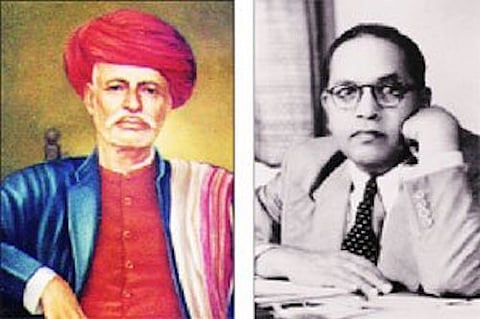
Minnesota – Minnesota marked a historic milestone by celebrating April 9–15, 2025, as “India Social Equity Week,” honoring the birth anniversaries of two of India’s legendary social reformers, Mahatma Jyotirao Phule and Bharat Ratna Dr. Babasaheb Ambedkar. Governor Tim Walz had signed a proclamation for the occasion, recognizing the enduring contributions of these antidiscrimination crusaders to equality, education, and social justice.
The proclamation, issued on April 10, 2025, commemorated Phule’s 198th birth anniversary on April 11 and Ambedkar’s 134th on April 14. It underscored Minnesota’s commitment to diversity, dignity, and equity—values championed by both reformers. Phule, born in 1827 in Pune, Maharashtra, was a pioneer of women’s education and founded the Satyashodhak Samaj to fight caste and gender discrimination.
Ambedkar, born in 1891 in Mhow, Madhya Pradesh, was the chief architect of India’s Constitution and a relentless advocate against untouchability, holding a PhD from Columbia University and a DSc from the London School of Economics.
“Minnesota is home to diverse communities, and we uphold the rights, dignity, and equality of all people,” the proclamation declared. It celebrated the global influence of Phule and Ambedkar, whose efforts inspired millions to pursue social, political, and economic justice. The week featured events organized with support from groups like the Ambedkar Association of North America (AANA), to uplift oppressed communities, encouraging reflection on the reformers’ legacy and the promotion of equity.
This celebration followed New York City’s groundbreaking proclamation of April 14, 2025, as “Dr. Bhimrao Ramji Ambedkar Day” by Mayor Eric Adams, the first time the city dedicated a day to Ambedkar. Minnesota’s recognition of both Phule and Ambedkar highlighted their shared vision, with Phule serving as a mentor to Ambedkar, who regarded him as one of his three gurus alongside Gautam Buddha and Sant Kabir.
Community leaders praised the initiative as a landmark achievement. AANA shared their pride on X, describing the proclamation as a “significant milestone” for social justice advocates. The week provided a platform to honor social reformers and renew commitment to equity, human rights, and dignity, resonating in Minnesota and beyond.
Governor Walz, speaking during the celebrations, emphasized the role of these values in fostering thriving communities. The proclamation, signed at the State Capitol and affixed with Minnesota’s Great Seal, stood as a powerful tribute to the transformative legacies of Phule and Ambedkar.
Ambedkar Jayanti 2025: What were Babasaheb’s views on land, caste and India’s agrarian economy?

While Babasaheb B R Ambedkar is well-known as the man who drafted the Constitution of India and who led the country’s Scheduled Castes in their fight for dignity, less well-known are his views on land ownership, India’s village-based agrarian economy through the prism of caste and the importance of land in the emancipation of Dalit Indians.
In his paper titled, B R Ambedkar on Caste and Land Relations in India, academic Awanish Kumar, currently an Honorary Fellow at the School of Social and Political Science, University of Edinburgh and Assistant Professor at the School of Development, Azim Premji University, Bangalore presented “Ambedkar’s thoughts on land and agriculture and their relationship with class and caste in rural Indian society”.
Kumar notes that Ambedkar recognised that India was a largely agrarian country, where the main source of earning was land. However, Dalits were excluded from land ownership due to religious sanction.
Ambedkar commented on this issue in Untouchables or the Children of India’s Ghetto, writes Kumar:
Babasaheb, adds Kumar, also noted the government must provide land to Dalits to help in their social upliftment.
Land, according to Ambedkar, writes Kumar was not just about economics bit also about social status. A person who owned land, had more social status than one who did not. “Land ownership in the agrarian system in India was as much about dignity as it was about social and economic freedom,” according to Kumar.
Ambedkar was also emphatic about who was a farmer and who was not. Kumar quotes his speech during the third session of the Kolaba District Peasants’ Conference on December 16, 1934, where Ambedkar begins by pointing out that the term shetkari (Marathi for ‘farmer’) was a misnomer, since it included everyone from the landlord to the landless agricultural labourer.
According to Kumar, Ambedkar was emphatically opposed to the Zamindari system of landlordism. “He was sympathetic to the masses of the peasantry, even as he was aware of social differentiation within the class of peasants.”
On land reform
Babsaheb differed with the mainstream view on land reform, according to Kumar. He was vehemently opposed to the idea of peasant proprietorship in agriculture and rather stood with the landless, most of them Dalits, who were often excluded from land reform discussions and debates.
Among the most radical ideas that Ambedkar floated regarding land reform in India was that Dalits be given separate villages, and that cultivable land be distributed to them.
Writes Kumar: “In demanding separate settlements for the Dalits, Ambedkar noted that while the Hindus lived in the village, the Dalits were forced to live in ghettos outside the village. Further, he argued that the village system of India was such that the Dalits, mostly landless labourers, were completely dependent on the Hindus for employment on land that the latter owned and controlled. Their wages were depressed for Hindus to profit and they had “no way of earning a living which is open to the Untouchables so long as they live in a Ghetto as a dependent part of the Hindu village” (Babasaheb Ambedkar Writings and Speeches, Vol. 1, p. 426)
Kumar chronicles that Ambedkar, in the second session of Ratnagiri District Bahishkrit Parishad (1931), suggested migration to “some better and distant lands” if Dalits wanted to get rid of the oppression in the villages. “He even suggested Sindh and Indore as destinations where he would try to secure cultivable land for the Dalits”. (Babasaheb Ambedkar Writings and Speeches, Vol. 17, Part 3, p. 128)
Babasaheb also suggested the nationalisation of land and collectivisation of agriculture under the auspices of the state. “Only such a policy, together with industrialisation and modernisation, he said, could break the ties of dependence and oppression between the people of the Scheduled Castes and caste Hindus,” according to Kumar.
“In Ambedkar’s worldview, the land question for Dalits is a component part of the struggle to annihilate caste, which, in turn, is essential to establish democracy in India,” he concludes.
Karnataka bid to breach 50% quota cap awaits tough judicial test
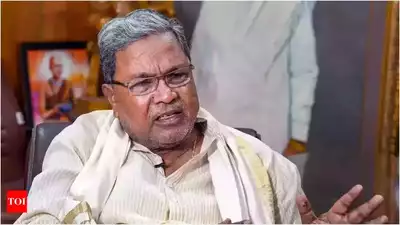
Special: Gujarat’s Dalits Juggle New Patterns of Hate, Violence and Police Apathy
caste
Idar (Gujarat): Shaileshbhai Chenwa covers his face with a white handkerchief, even when he sits within the confines of his home in Vadol village near north Gujarat’s Idar town. Chenwa, a 32-year-old Dalit daily wage worker, limps when he walks and has blue and black patches all over his body.
Chenwa is not ill. He is ashamed of what happened to him on March 11.
Weeks ago, Chenwa left home to work at a cold storage unit in Idar. Chenwa made it to work and worked through the day, but when the day ended, he was abducted by a group of Thakurs. Beaten and bruised, Chenwa could not fathom what may have angered the Thakurs. Later, the Thakurs who abducted him stripped him naked and paraded him in front of the entire village of Nani Vadol.
While naked, they also made him write an apology letter, wherein he promised to never speak to a Thakur woman again.
Today, Chenwa does not step out without covering his face.
“Everyone saw me naked; it was as if I was an animal, no one came to save me,” he told The Wire.
‘Who cares?’
Kishenbhai Senma still remembers the day in 2022 when he got married. It’s not heartfelt memories of a joyful day that he has, though. Thinking about what happened still sends shivers down his spine.
In August 2022, laden with blessings and flowers, Senma sat atop a horse, all ready to reach his to-be bride’s house for the wedding rituals. Soon, Thakurs arrived and dragged him down the horse, using provocative casteist slurs against Senma and his entire family. Senma, a resident of Vansol village in north Gujarat’s Mehsana, was stopped from taking his procession on the horse forward, simply because he is a Dalit.
“These believers of Manusmriti think of us as if we’re pests, insects, parasites. They have always treated us like this. But we won’t tolerate it any more,” Senma told The Wire.

Kishenbhai Senma’s village Vansol in Kadi block, Mehsana. Photo: Tarushi Aswani
At first when the incident happened, their first thought was to avoid any action which would anger their oppressors more. But after a month, Senma filed a case against the Thakurs who harassed him.
“When we tried to file an FIR, the police suggested that this matter could be solved without investigation. Then we realised we must go to the courts to claim our rights,” Senma said.
Sukhabhai, 60, is a village elder who has been witnessing anti-Dalit oppression for years now. “Our lives are only worsening, but no one cares about us. We are only an uneducated clan of people who aren’t even appeased as a vote-bank anymore. Who cares if some of us live with trauma, who cares if an upper-caste kills us tomorrow?” he asks.

Kishenbhai discusses his case with NGO workers from Navsarjan. Photo: Tarushi Aswani
Though Gujarat is very often advertised as a model, developed state, according to data tabled in Rajya Sabha, the conviction rate in cases of atrocities against Scheduled Castes between 2018 and 2021 was a mere 3.065 %, much lower than the national average. According to data acquired under the Right to Information (RTI) Act, acts of discrimination in urban Gujarat are extremely high as well. Ahmedabad city reported 189 cases – the highest number in the state – of atrocities against SC people in 2022. The state recorded a total of 1,425 such cases.
From 2018 to 2021, only 32 cases out of the 5,369 registered cases were proved against the accused. In at least 1,012 registered cases, the accused were acquitted, even when the charges were as serious as murder and rape.
Adopted by Amit Shah
Bileshwar village in Gandhinagar’s Kalol is usually quiet and slow moving. The village doesn’t particularly stand out, except for the fact that it is outlined with factories and industrial buildings.
January 29, 2024 was just another ordinary day in Bileshwar. Geetaben was milking her cow when teenage Thakur boys were playing near her. Geetaben asked them to play elsewhere as they would scare her cow. The teenagers began abusing Geetaben, triggering her son get involved in the scuffle too. This was sorted out by the police and everyone went their separate ways.
The next day, in the evening, at least 200 Thakur men allegedly arrived on trucks in Rohitvas colony, where Geetaben and other Dalits live, and began barging into homes with sticks, stones and rods. Creating a ruckus, they pelted stones at houses and severely wounded Geetaben and her family, and anyone who came in between to try to stop the Thakurs from rioting. “The police discouraged us from filing an FIR, it was as if they would never catch the culprits,” Geetaben explained.
But once Geetaben filed an FIR, the police allowed Thakurs to file a counter FIR too.
“This village was adopted by home minister Amit Shah, yet we face this. Has he forgotten us?” asked Baldevbhai, a village elder. “Things are only getting worse; we are going back to the olden times. Thakurs enjoy unbridled power over us. The MLA from Kalol is also a Thakur, he is from BJP, that is why their community has a freehand here,” he told The Wire. The MLA is Thakor Laxmanbhai Punjaji (Bakaji) from Kalol-Gandhinagar
While Geetaben’s case is being pursued in the District Court Kalol, fear grips her every now and then. She shivers while following her routine. “It has been a year, but I still feel very disturbed when I step out even in my own area. I am always worried for my family,” she said.
Nuances of hate
The Wire also met with other victims of caste-based atrocities, and in Idar’s Chitrodi village, the victim shared an unusual case of harassment. Sombhai Chenwa, a cotton farmer, is scared of cows and bulls – an ironic predicament in his profession. Chenwa has developed a fear of unknown cattle ever since people from the Rabari community purposely let loose their animals in his field. Six months ago, Chenwa called out a man from the Rabari community for this. He was harassed, beaten and subjected to caste-based slurs. Chenwa bled from his head for questioning the Rabari community for their newest pattern of harassment.
In January 2019, Dahyben Vankar was attacked by a group of Thakurs who were angered because Vankar’s grandson defeated the Thakurs in a kite-flying competition. Vankar, 65, was beaten and her home vandalised. With the guidance of Jan Vikas, an NGO, Vankar filed a case under the Scheduled Castes and the Scheduled Tribes (Prevention of Atrocities) Act, 1989. Six years later, her case is still being heard at the District Court Idar. The last hearing scheduled on December 17, 2024 could not happen due to the absence of the accused party in court.

Sombhai near his farm in Chitrodi village. Photo: Tarushi Aswani
Every victim The Wire met with sketched out a scheme of harassment being used to target them. There was a common theme – the deployment of the OBC persons to make their lives miserable.
For instance, all the victims shared how the Thakurs, the Rabaris or the those from the Suthar community were the main and major attackers of Dalits. All the accused in the above-mentioned cases belong to OBC groups. Dalits said that mundane, day-to-day occurrences were being made into issues against them, to provoke them and then finally get them entangled in a web of worries, police cases and courts.
Patterns of ignorance, normalisation
“The BJP believes in the ethos of the Manusmriti – which talks about treating Dalits in a humiliating manner and talks about unleashing violence on the Shudras. That is the reason why there is little to no conviction against our oppressors,” Jignesh Mevani, MLA from Gujarat’s Vadgam Constituency, Gujarat and convener of the Rashtriya Dalit Adhikar Manch, told The Wire.
Mevani also explained how Dalits have never mattered to the BJP, since they are only 7% of the population of the state and do not comprise a lucrative vote bank. The low conviction rate, according to him, “shows how the government of Gujarat and police are at best indifferent and apathetic to the Dalit community”.
In 2023, Mevani launched the ‘Swabhiman Helpline’ (9724344061) to help people from marginalised sections of society with legal proceedings. This, he had announced, would aid people from various communities including the Dalits, tribals, Muslims, women and denotified tribes, who face atrocities and discrimination. “Our helpline has received 113 calls and has managed to get 150 culprits arrested, but this also shows that the people already exhibit a lack of faith in the justice dispensation institutions in the country,” he said.
According to the 2011 Census, the population of the Scheduled Castes in Gujarat stood at 40.74 lakh, which constituted 6.74% of the total population of the state of 6.04 crore. This approximate 7% population, Mevani explained, was the last of the concerns of the Gujarat government, since the last two decades had seen no government-led campaign to tackle atrocities in the state.
The situation of Dalits is only worsening since 2010, according to the data from Scheduled Caste and Scheduled Tribe Cell. The National Crimes Bureau’s 2020 report put the number of crimes against Dalits in Gujarat at 1,313. In March 2019, Gujarat’s minister of social justice and empowerment Ishwar Parmar told the state assembly that the crimes against Dalits in the state had risen by 32% between 2013 and 2018. In 2018, 49 cases of atrocity were registered in the Ahmedabad district, 23 in the Banaskantha district, 34 cases in Junagadh, and 24 in the Surendranagar district.
On this consistent rise of violence against Dalits, Martin Macwan, a veteran activist from Gujarat, and the founder of Navsarjan Trust, Dalit Shakti Kendra and Dalit Foundation, told The Wire, “The striking difference so far as the state response is concerned in relation to the atrocities on Dalits today is not even a tehsildar cares to visit the victims today, compared to earlier times when at least a minister would visit. While the atrocities are rising, the state administration as well as even judiciary are airing their prejudices in open that the atrocity act is misused” – though there is no factual evidence on such misuse. Macwan also added that tragically, in Gujarat even the SC and ST MLAs from the BJP have failed to compel the state to respond to such violations.












Comments
Post a Comment